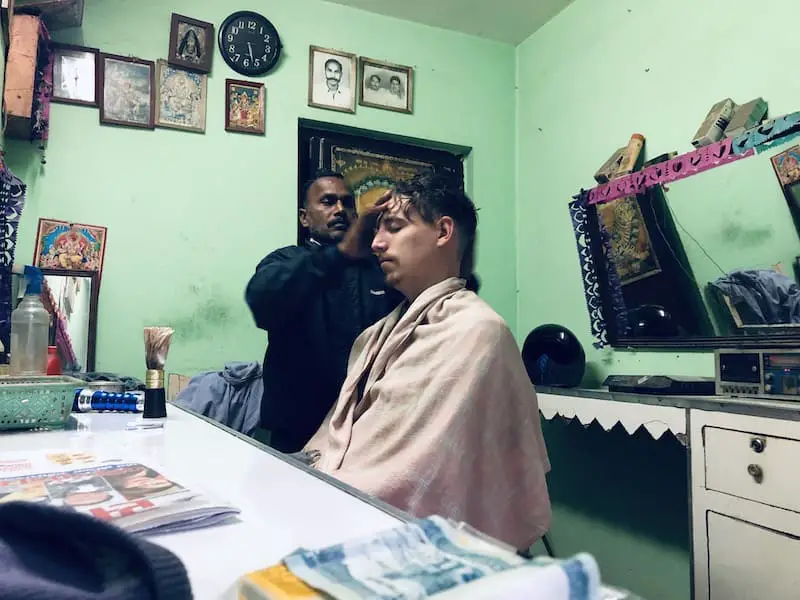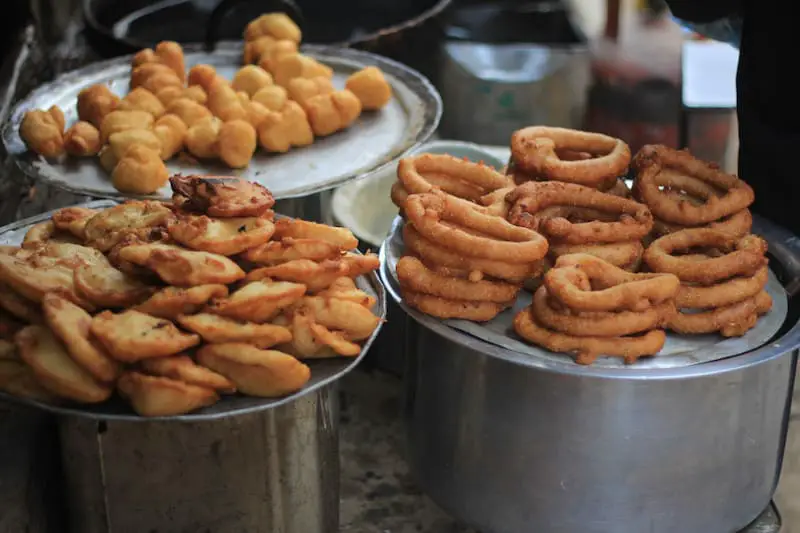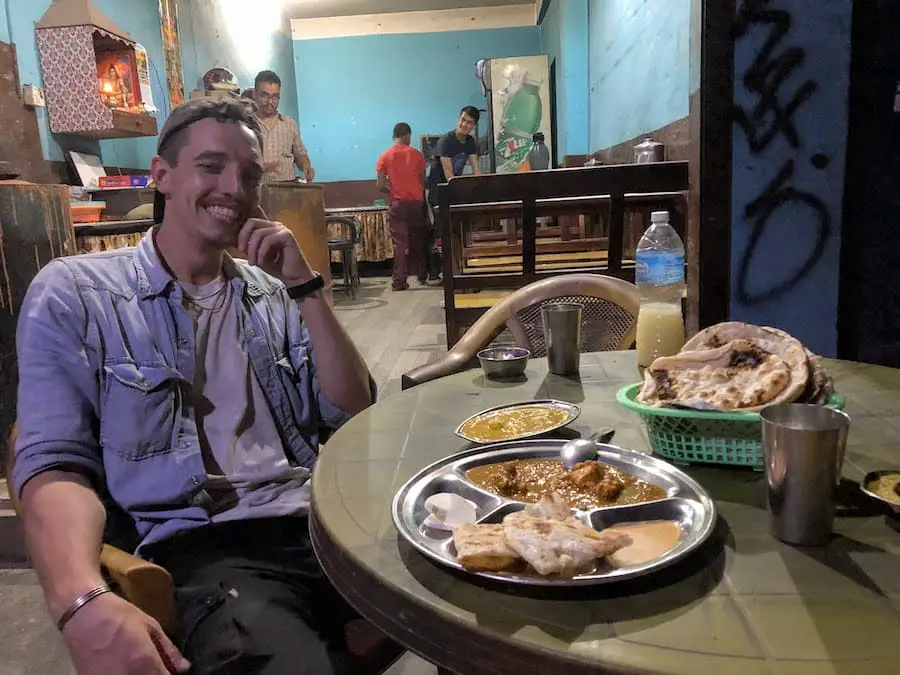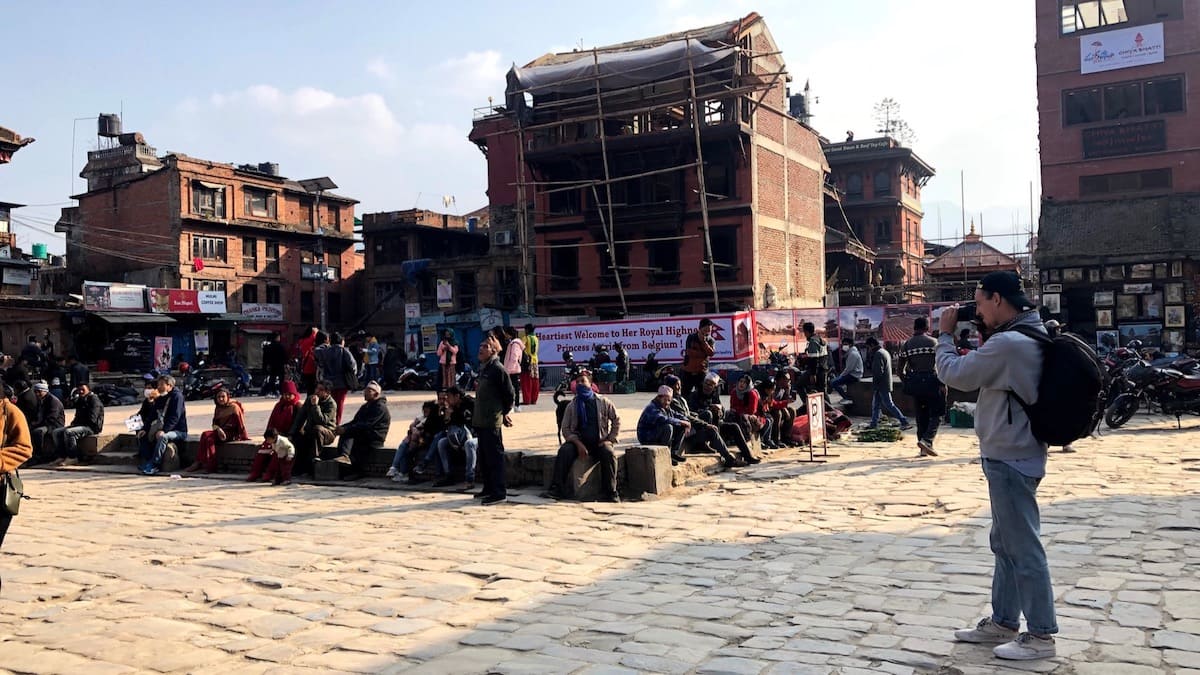Traveling to Nepal can be an amazing experience. With trekking some of the tallest mountains in the world on a lot of people’s bucket lists, it is no surprise that millions of tourists flock to Nepal each year. Although the country is extremely thrilling, it can be a lot to handle for people visiting from developed countries around the world. In this regard I tap into my experience of living in Nepal as an expat, to offer up my best travel Nepal tips!
Without further ado, let’s get right into the list of tips for traveling in Nepal.
1. Always carry cash:
Nepal’s economy is dominated by cash. Many shops don’t have the capability of taking international cards, or other forms of payment. If they do have the capability to take cards, you may lose out on exchange rates as well as other international charges.
Additionally, the more remote you go the less access to card payments, or even ATMs. So make sure to load up on cash before you go trekking or to smaller villages.
2. Give yourself extra time with everything:
Just because you were told a specific time, for an event, or a bus, make sure to take it with a grain of salt. There is a common expression in Nepal – everything works on ‘Nepali time’. Nepali time means that it is not unusual to have something happen 30 minutes or even an hour after the expected time.
So make sure to give yourself a little extra time if you are traveling somewhere, as there is a good chance the taxi or bus will be late. Moreover, if you are meeting someone, tell them a time ten or minutes before you actually want to meet. This will give you a little extra time, just in case they do show up late.
In the bigger cities, like Kathmandu and Pokhara, people are more punctual than other remote areas. Just be prepared and don’t be surprised if you end up waiting for someone.
3. Expect the unexpected:
One of my best travel Nepal tips is to be patient and easy going. This is because things rarely go as expected. Nepal is a very dynamic country, and you will often find your plans going out the window for multiple reasons – natural disasters, heavy rainfall, strikes and political uprisings, or even just because your tour guide never showed up.
During my last five years of living in Nepal, I have found myself in very unexpected scenarios, with all of my plans for the day being lost. With these situations happening more than I even want to admit, the only saving grace I had was that I was easy going and flexible. When traveling in Nepal, you have to be flexible, otherwise you’re going to find yourself with a constant headache.
4. Don’t drink the water:
Nepal does not have potable water. It is important to avoid drinking water in Kathmandu. I would even suggest not drinking any of the piped water in the other large cities in Nepal as well.
Most of the water in Nepal is not treated to a high enough standard, or even at all. It is best to avoid drinking any water that hasn’t been filtered, to avoid getting sick. Always ensure that the water you received in restaurants has been filtered, or is from a sealed bottle of water.
5. Make sure to wash your fruit:
It goes without saying, but all fruit you buy should be washed thoroughly. Fruit sold on the street can get quite dusty and dirty. Moreover, the fruit changes hands quite a few times during the day and you can never be too sure how clear the fruit is.
A quick rinse and wash from water, will help you stay healthy and avoid any unwanted illnesses during your stay in Nepal.
Another tip for buying fruit, is to look for flies buzzing around. Although it may seem disgusting, being able to see flies can be a good sign of the fruit being ok to eat. This is because there have been instances where shopkeepers spray their fruit with chemicals (cleaners) to keep flies away and to make their fruit look more sanitary than others. This is not a common occurrence, and I have only seen it once or twice during my five years in Nepal, but it is something to keep in mind!
6. Negotiate for everything:
It is very common to get overcharged for goods and services in Nepal. It is best to always negotiate for things – do it respectively of course. Sadly it is just the way business is conducted in Nepal with consumer goods and services. You will commonly hear a shopkeeper tell you the product costs “NPR 2,000, but for you it’s only NPR1,500”. However, don’t be fooled, as the price quoted is probably more expensive than it should be.
Moreover, you will also see different prices listed for Nepalis, Indians, SAARC nationals, and foreigners. This is once again unfortunate, but there is a perception that all foreigners are wealthy and have the capability to pay more for services – and thus should pay more.
Once again this is just how business is conducted in certain areas of Nepal. It doesn’t only happen to foreigners however. Even Nepalis find themselves having to pay more than what is listed. A recent court case in Kathmandu, found that hotels were overcharging Nepalis as well!
7. Ask locals or trusted Nepalis about prices:
In line with travel Nepal tip number six, tourists should ask locals, friends, or even their hotel’s staff about prices. By asking people you trust, you will be able to get a cost range for certain services and goods. This will help you negotiate better as well as protect you from getting overcharged.

For example, I move around the country a lot, and need to get my haircut in different places. As prices for haircuts fluctuate from place to place, I make sure to protect myself from getting overcharged by asking friends about the price. By asking prior to getting my haircut, I have saved more than NPR 400 – my friend told me to get my haircut it only cost NPR 100. The barber told me 500!
Curious about how much you might pay in Nepal for vacation? Check out my How Much Will a Trip to Nepal Cost article out!
8. Carry a powerbank:
Power cuts are unpredictable, and can happen at any time. To make sure your phone is always charged, it is best to carry a powerbank with you in case of emergencies. Additionally, a power bank can come in handy while traveling around the city or even on longer bus rides, as it will be difficult to find places to charge your belongings.
9. Get a sim card for your phone:
Another great travel tip for Nepal is buying a sim card for your phone. Not only will it help you stay safe, while traveling, it will also ensure that you have constant internet access. As finding a strong wifi signal in certain areas may be difficult.
Plus, it only costs NPR 100 to get a sim card from Ncell and NTC (top phone service providers in Nepal). After you get a sim card, all you need is to buy some recharge cards and you are good to go. You can get 10 gb of internet service for around NPR 600 (USD 5)!
10. Bring a universal plug adapter:
Make your life easy and bring a plug adaptor with you. This will ensure that you can charge your belongings no matter where you are. Nepal has a two pronged plug, but I have seen places all around the country with weird plugs, making it difficult to charge things.
11. Carry hand sanitizer:
Things can get dirty out there, and there’s not always a place to wash your hands. One of the most common ways I find my hands getting dirty is by petting different street dogs and animals (not advisable but I can’t help it!) Therefore, to make sure to keep your hands nice and clean, it is always best to carry hand sanitizer around with you.
12. Always use your right hand:
When doing anything in Nepal – eating, greeting people, handing over money, etc. – make sure to use your right hand. Although the practice may be a little outdated, it is still considered to be polite and respectful. From just a few days in Nepal, you will notice that this cultural practice is still quite prevalent.
Only using your right hand stems from people having to use their left hand to clean themselves after the bathroom. Although it is more common for people to have western toilets, and use toilet paper, many people still use a squat toilet, and water as well as their left hand to clean after defecating.
13. Be cautious with street food:

Street food in Nepal is delicious. But it can also be questionable at times, due to a lack of hygiene. Because of this, many tourists avoid street food in Kathmandu while visiting.
However, I don’t think you need to avoid street food as long as you are smart about it. Make sure to examine the stall and see how the food looks, and if the vendor uses basic hygienic practices. Also, if you find there are a lot of other people eating at the food vendor, you are probably safe!
I have gotten sick plenty of times over the years from eating street food. Both because of my lack of judgment, and even when I use my best judgment. It just happens at times. Therefore, my travel Nepal tip on this is, if you plan on staying a longer time in Nepal, then go for it! You will have plenty of time to recover. But, if you are only in the country for a few days, it might be a better idea to just forego the street food to protect yourself during your short trip.
Just make sure to be smart about what you choose to eat!
14. Always carry your passport with you:
It’s a good idea to always carry your passport with you. First off, it’s important for your safety. Second, you will find random times during your travels in Nepal that you will need to show your passport, or some form of identity. It’s always easier to be prepared for these random times.
You can also carry a photocopy of your passport as this will suffice most of the time. Also, carry a few passport sized photos as well, you will need these when signing up for different services or permits.
15. Don’t mess with the monkeys:
You will see thousands of monkeys during your stay in Kathmandu, as well as in places like Lumbini. Although they may look cute and exciting, these monkeys have been known to steal food, hats, glasses or anything you are carrying.
Additionally, research has shown that many of the monkeys in the Kathmandu region (especially around Swayambhunath, an auspicious temple in Nepal) are carriers of diseases.
And if that wasn’t enough for you, I have also had monkeys try and fight me! Be careful, and be mindful of yourself and your belongings when around monkeys!
16. Avoid night buses:
Although traveling long distances on night buses is a great way to conserve your time in Nepal, they can be extremely dangerous. Traveling is one of the most dangerous activities in Nepal, and it is only amplified at night.
Whereas, in 2019, there were nearly 13,000 highway and road accidents in which 2,736 people lost their lives and 10,731 were seriously injured. Nepal has seen a steady growth in road accidents over the last 10 years. With many happening late at night and early in the morning.
If you are short on time, it may be a better idea to book a private car, or even take a flight instead of taking a night bus.
17. Use Pathao (Nepal’s version of Uber):
Or, instead of taking public transportation, you can also use Nepal’s version of Uber: Pathao. You can download the app, and easily book a motorcycle taxi, or private car service to get around. This is by far the cheapest and most effective way to get around the Kathmandu valley.
Also it is extremely safe. All the drivers are vetted, and have ratings to ensure that you are comfortable with your driver. The app also constantly follows the driver, so your location is always known! You can even share location with a friend or family member so they can track you as well.
Pathao is open late, and you can get rides 24/7!
18: Choose your food wisely:

When ordering food, make sure you know what you are getting into. What I mean by this is that, even though restaurants have a wide variety of food available, it doesn’t mean it will be good. Or even up to your standards.
For example, I went to Angan (An Indian restaurant – that serves absolutely amazing Indian dishes and sweets!) the other day, where two foreigners ordered a pizza. They did not ask or even look around to see what other people were eating before they ordered.
This resulted in them getting their pizza 20 mins late, it being smaller than they expected, and lower in taste quality than they expected.
The moral here is that restaurants have specialties. Just as you wouldn’t go to Taco Bell for a hamburger, don’t go to a specialized restaurant and ask for the exoctic food on the menu (like pizza). Look around, see what other people are eating and go with that! Or, find another restaurant that specializes in the dish you are looking for.
19. Carry water with you wherever you go:
Depending where you are, it may be difficult to find water to drink. This goes back to my travel Nepal tip number four: don’t drink the water. While hiking around, riding buses, or even at some restaurants you may not get clean water. And although you can buy plastic water bottles, environmentally it is not great. Additionally, it can get quite expensive always buying water everywhere you go.
20. Carry an emergency light:
Power cuts can happen at any time, and can last for who knows how long. This means it can get quite dark in some hotels and places. So my tip for traveling in Nepal for this is to make sure to bring an emergency light, a head light, or to always ensure that your phone is charged to use its flashlight.
Not only does an emergency light come in hand for power cuts, it is also a good idea if you are walking around late at night. Street lights are not common in all areas, and you may find yourself walking in the dark. Therefore, to protect yourself from traffic, or on uneven paths and roads, make sure to carry an emergency light with you.
21. Wear a mask in polluted areas:
The pollution in Kathmandu is crazy bad. It can be quite hard to breathe at times with the pollution as well as dust – Kathmnadu has a nickname of ‘dustmandu’. Wearing a mask in Kathmandu can help you stay healthy and avoid a sore throat, or headache from the dust and pollution.
Air quality in Kathmandu is often so bad that it crosses the WHO related limits into the hazardous to health rating. Whereas, in 2020 Kathmandu had an air quality rating of 430, making it some of the dirtiest air in the world.
The poor air quality in Kathmandu, is one of the many reasons why I suggest visiting or living in Pokhara, in my blog about Kathmandu or Pokhara: Which city should you visit in Nepal.
Key Takeaways: Travel Nepal Tips
These are some of the things I wish I knew before traveling in Nepal. My 21 tips for traveling in Nepal are based on my personal experiences over the last five years. Of course these are not hard-fast rules, but they will help ensure you have a safe and fun trip in Nepal.
Let me know if there is any other travel Nepal tips that should have made my list!
